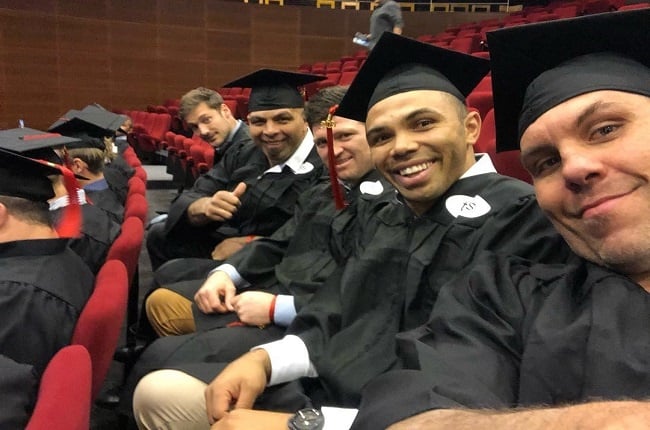


Bryan Habana last year graduated from business school. (Twitter)
- The Covid-19 pandemic has magnified rugby players’ need to secure their futures with backup career plans, but the issue is characterised by its contradictions.
- While the majority of SA’s professional players acknowledge that they give much thought to their transition after rugby, 53% of respondents from a recent MyPlayers survey stated they don’t actually have career plans in place.
- Griquas coach Scott Mathie, a disciple of career planning, notes that entitlement is a problem, while Springbok Oupa Mohoje advises that players need to find people for guidance.
South African rugby players planning for a future after their playing careers is an issue riddled with contradictions.
The Covid-19 pandemic, with its accompanying pay cuts to help save the local game up to R1 billion, has merely served to magnify the importance of trying to implement some form of financial security.
According to MyPlayers’ latest annual player survey, which was released just before the virus struck, 76% of the respondents stated that it’s their responsibility to make an effective transition from rugby.
Approximately 93% ponder the issue on a consistent basis, with 67% going as far as admitting that it’s “always on my mind”.
That sense of duty to oneself and family is something that has struck Scott Mathie since becoming a coach at senior level.
“The days of rugby being the only thing a rugby player is preoccupied with are gone. You’ll rarely find dim guys playing the game in South Africa,” Griquas’ head coach told Sport24.
“Here at Griquas, I’ve been particularly aware of it because we recruit quite a few Varsity Cup stars. These guys actually make a point of finishing their degrees before fully concentrating on their professional rugby careers. I’m very encouraged by that.”
Mathie, who played for the Bulls, Sharks, Kings and Sale during a decade-long career, is a prophet for players’ need to plan for the future, particularly because of various personal experiences.
Due to his commitments on the field of play, it took the Durbanite almost 10 years of full- and part-time study to belatedly obtain a BA in English and History at Leeds Metropolitan.
Mathie’s initial plan to study journalism explains why he crammed being a columnist for the Manchester Evening News and freelance reporter for Sky Sports between his Leeds Carnegie and Sale stints.
“It was a savage time,” he admitted.
“For a year I would work on a Saturday and then be ready to play on a Sunday. But I decided to do some work on the side. Not only did I feel it broke the monotony of a professional player’s weekly routine, but I realised the need to put something else in place too.”
Andre Pretorius, former Springbok flyhalf and current NWU-Pukke head coach, also noted how well his charges had been doing combining studies with playing responsibilities.
“I’ve been really proud of the players I’ve worked with,” he told Sport24 previously.
“I’ve never once had a problem. They’ve always been on time for every practice session without neglecting studies. You can see that these young men are taking responsibility for their future, whether it be rugby or another career.”
Yet thinking about the future and doing something about it is two different things.
MyPlayers’ research also revealed that 53% of the respondents didn’t have career plan in place after rugby, with just 56% having an alternative career or revenue stream to rely on.
While a tertiary education is not necessarily essential to carving out a successful career outside the sport, it’s significant that 41% of the surveyed players weren’t even working toward any professional qualification.
Naturally, this isn’t merely down to a lack of guidance, but also personal finances.
After all, 471 of South Africa’s 717 professional players – before SA Rugby’s industry cost-saving plan was implemented in May – were earning less than R500 000 annually, of which 273 pocketed R240 000 or less per year.
Springbok Oupa Mohoje, recently elected onto the International Rugby Players’ board, told Sport24 previously that players have to find some way to diversify their interests.
“My long-term (two-year) knee injury made me re-examine my priorities. I got my off-field affairs in order, to make sure that if I might not be able to play again, I have a backup,” he said.
“I saw a therapist predominantly to help me deal with the mental stress of my injury, but even if you are okay, it’s really beneficial to talk to someone. Sometimes it’s even just about guidance.”
And some solid guidance can go a long way towards a crucial career or life decision, particularly as the MyPlayers survey pointed out that numerous players simply haven’t had the privilege of a mentor, like a father figure, to assist in that regard.
Mathie also raises the uncomfortable yet unavoidable reality that South Africa’s strong, lopsided schools system breeds a culture of complacency.
He experienced it first hand as director of rugby at Durban High School.
“Many of our players live in a bubble. It cultivates a sense of entitlement. Everything is done for you. Sometimes you even get youngsters who believe they should be given a break from the harsh realities of life because they’re gifted players,” said Mathie.
“I think it’s absolutely vital that players have something else to fall back on. I’d even go as far as encouraging young players to become entrepreneurial because it’s a great way to learn responsibility, particularly when it comes to hard work.”

